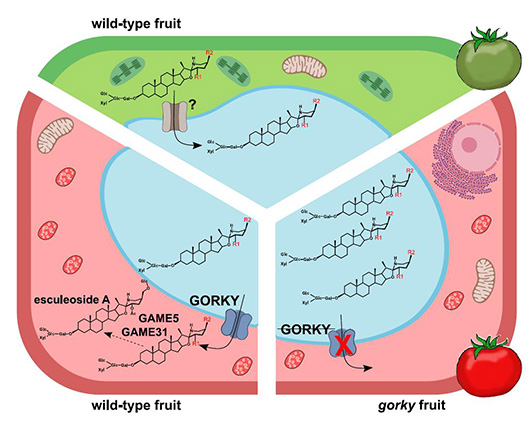New study from DynaMo explains tomatoes’ sweetness
A new study from the Center of Excellence Center for Dynamic Molecular Interactions (DynaMo) at the University of Copenhagen has discovered that tomatoes’ taste depends on a transport protein called GORKY, which is indispensable in preventing tomatoes’ bitterness. The study has been published in the scientific journal Nature Plants.

Up until now, it was unclear exactly how tomatoes let go of the bitterness that characterizes unripe tomatoes, and how they develop their sweetness. Now, a new study from the Center of Excellence Center for Dynamic Molecular Interactions (DynaMo) at the University of Copenhagen has discovered tomatoes’ taste depends on a transport protein called GORKY, which is indispensable in preventing tomatoes’ bitterness. The study has been published in the scientific journal Nature Plants.
“We found a transport protein that plays a central role in removing the toxic compound called tomatine from ripe tomatoes. Without this protein the ripe red tomatoes would taste just as bitter as the bitter green tomatoes and thereby be unfit to eat,” said Associate Professor Hussam Hassen Nour-Eldin from DynaMo, co-author on the study.
A long international collaboration
The transport protein GORKY got its name from the word gorky, meaning bitter in Russian. During the fruit ripening the protein becomes active and exports the bitter tomatine from the cell’s internal storage compartment. The study screened a collection of 650 different tomato varieties to identify nine different bitter tastings. It was here that the researchers discovered that all of the bitter varieties contained a mutation that makes the GORKY-gen non-functional, while the sweet varieties all include a functional GORKY-gen.
“The work is the result of a long international collaboration, which has included low-level practical experiments such as students tasting hundreds of tomato varieties to find bitter variants, but also very advanced technology. Among other things, our contribution has included a characterization of the transport protein in eggs form the South African seed Xenopus laevis,” said Associate Professor Hassen Nour-Eldin and adds:
”The discovery is exciting as it gives us new tools to improve both the taste and nutritional value of some of our most important crops such as tomatoes and potatoes that comes from the same family.”
Read the new study about tomatoes at the University of Copenhagen here
